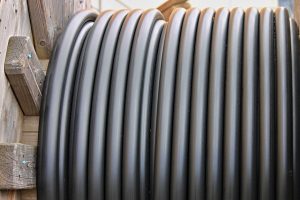
Have you heard of armored cable? If so, you might be wondering how it differs from other types of cable.
What Is Armored Cable?
Armored cable is a type of electrical cable that features a protective metal sheath. It’s typically used to carry electricity. Many power stations use armored cable to transfer electricity to customers.
Most types of cable have at least some form of protective outer layer. Cables are characterized by multiple wires or “conductors.” To protect these wires from damage, they feature an outer layer, such as a sheath. The sheath insulates and shields the underlying conductors from damage. This allows the cable to be used in harsh environments, such as the outdoors or even underground. Rather than featuring a traditional polyvinyl chloride (PVC) sheath, though, armored cable features a metal sheath.
Common types of armored cable include the following:
- Metal-clad (MC) cable
- BX cable
- Underground cable
Advantages of Armored Cable
Like all types of cable, armored cable features multiple conductors. The material from which these conductors are made, however, varies. Some types of armored cable features all-copper conductors, whereas others use aluminum or copper-clad aluminum conductors.
Armored cable features a metal sheath. That’s essentially what distinguishes it from other, non-armored types of cable. The sheath may consist of steel wire, aluminum wire or metal tape. The sheath may consist of a single, continuous tube, or it may consist of interlocking strips of material.
It shouldn’t come as a surprise to learn that armored cable is durable. It can handle extreme environments without succumbing to damage or degradation. The metal sheath protects the underlying conductors from damage caused by physical impact, rodents, moisture and more.
The metal sheath also minimizes electromagnetic interference. It promotes stable electrical signals — even when used across long distances. Other types of cables, in comparison, are more susceptible to electromagnetic radiation due to the lack of a metal sheath.
Disadvantages of Armored Cable
While it offers many benefits, armored cable does have some potential disadvantages. For starters, it’s heavier than most types of cable. The presence of a metal sheath adds weight to armored cable.
In addition to weighing more than other types of cable, armored cable is less flexible. It can’t bend or flex as easily as PCV-sheath cable. Furthermore, armored cable is more difficult to work with. It requires more time and effort to cut and manipulate when installing.
